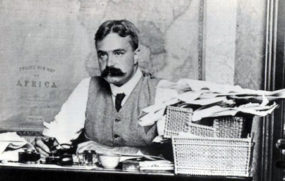Just Give

In the summer of 1882, a young artist took a job as a bellboy in a hotel. The salary was $10 a month but he was told tips could surpass $100 in a season. When offered his first tip after helping a guest with his luggage, something within him prevented him from accepting it. “No, thank you sir,” he stammered and hurried off.
Why did I refuse the tip, he wondered. He then suddenly realized the rightness of his decision by the lightness in his heart. He resolved to be the best and only bellboy who never took a tip. When asked why he did not take tips he replied, “I receive a salary and I love my work.” This endeared him to guests who invited him to dinner parties and yachting trips. Instead of the $100 he might have received from tips, the guests paid over $850 for his artworks. He developed lifelong friends from whom he received many more commissions for painting.
From this experience, the universal law of reciprocal action became a reality to the young artist. He now knew for certain that whatever a man does to or for another, he does to or for himself. Help flows abundantly to the man who always give more to others than they expect, and does it cheerfully.
*Inspired from Glenn Clark’s “The Man who Tapped the Secrets of the Universe”



